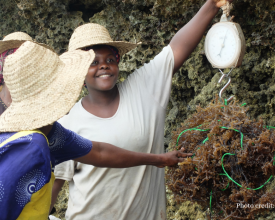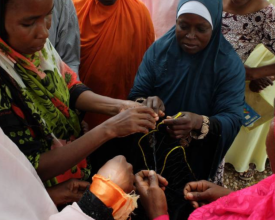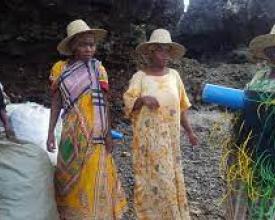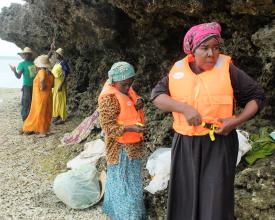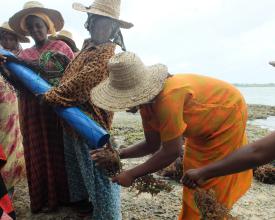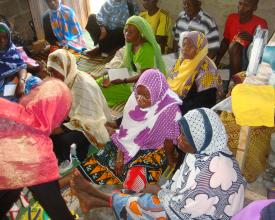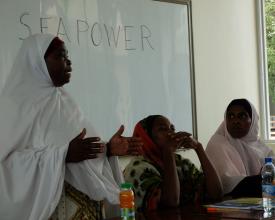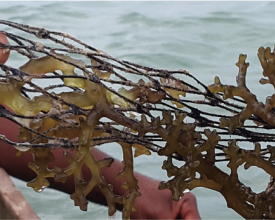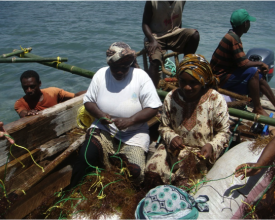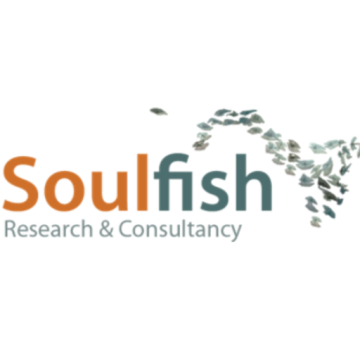
Sea PoWer : une technologie innovante de culture d'algues pour l'autonomisation des femmes
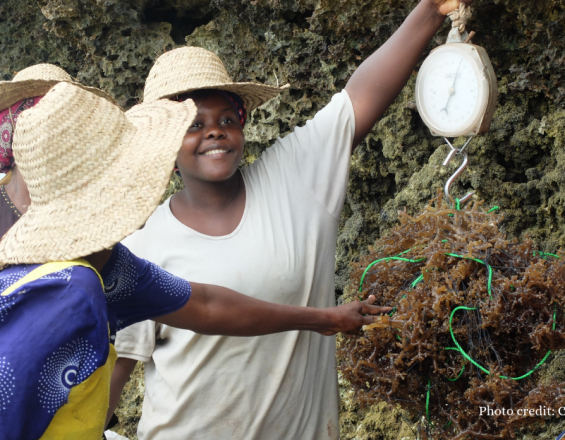
À Zanzibar, la culture des algues est une activité de subsistance à petite échelle mais importante, pratiquée à 80 % par des femmes. Récemment, des baisses de production ont été observées et il a été prouvé qu'elles étaient principalement dues au changement climatique.
Les filets tubulaires - une innovation pilotée dans le cadre de l'initiative Sea PoWer - se sont révélés prometteurs par rapport à la technologie traditionnelle des piquets et des cordes pour améliorer la productivité des algues et les conditions de l'écosystème local. Cependant, les filets tubulaires sont utilisés dans des eaux plus profondes et requièrent donc des compétences en natation ou en navigation que la plupart des femmes ne possèdent pas. L'établissement de fermes d'algues en eaux plus profondes, à l'aide de nouvelles technologies, ne pourrait être une option d'adaptation réussie qu'avec un soutien institutionnel, des investissements significatifs, l'autonomisation des femmes et la participation des communautés locales.
Contexte
Défis à relever
Défis technologiques:
La méthode traditionnelle de culture des algues marines en eaux peu profondes à l'aide de la méthode "piquet et corde" est inefficace en raison des facteurs suivants
- Les températures élevées de l'eau et les variations de salinité dues au changement climatique, qui entraînent des maladies ("ice-ice") et empêchent la croissance des espèces d'algues Cottonii de grande valeur.
- La perte d'algues, qui se détachent des cordes au gré des courants.
- Les algues sont de mauvaise qualité (épiphytes).
Défis sociaux et économiques:
- Les femmes sont confrontées à de mauvaises conditions de travail :
- Elles restent assises dans l'eau de mer pendant de longues périodes pour démêler leurs cordes.
- Elles portent des matériaux lourds et des récoltes sur la tête.
- Elles souffrent de piqûres et de coupures causées par les oursins et les coquillages pointus lorsqu'elles pataugent dans l'eau.
- Les prix payés aux producteurs pour les algues récoltées sont très bas.
- Il n'y a pas de transformation ni de valorisation des algues à Zanzibar.
- Il existe très peu de moyens de subsistance autres que la culture des algues pour les femmes.
Emplacement
Traiter
Résumé du processus
L'objectif de Sea PoWer est de mettre au point, en partenariat avec les femmes productrices d'algues, une technologie de culture d'algues adaptée - les filets tubulaires - qui transforme leur vie, répond à leurs aspirations, à leurs besoins en matière d'agriculture et de moyens de subsistance, contribue à l'intégration durable de la culture d'algues dans les paysages économiques et écologiques locaux et est prête à être étendue et adoptée à grande échelle dans l'ensemble de l'océan Indien occidental.
L'initiative Sea PoWer a adopté une approche progressive combinant innovation et autonomisation, afin d'améliorer simultanément la productivité des algues et les conditions de travail des femmes, ainsi que d'agir comme un vecteur d'émancipation en améliorant leur position, leur prise de décision et leur visibilité dans la société zanzibarienne.
L'élément central est la co-génération de connaissances et le renforcement des capacités des femmes cultivatrices d'algues en termes de savoir-faire technique, de capital social, d'estime de soi et de confiance, grâce aux interactions avec l'équipe du projet, les autres producteurs, les membres masculins de leurs communautés, les acheteurs d'algues et d'autres parties prenantes de l'industrie.
Blocs de construction
Renforcer les capacités et le capital social des femmes
Sea PoWer a facilité la formation de deux groupes de femmes productrices. Il les a impliquées dans la conception de la technologie du filet tubulaire (par exemple en testant la longueur du filet et la méthode de récolte) afin de s'assurer que la technologie était adaptée à leurs besoins.
SeaPoWer a développé la capacité des producteurs à :
- Construire des filets tubulaires.
- Planter et surveiller la croissance des algues.
- Tenir des registres.
- Assurer la sécurité en mer (par exemple, porter des gilets de sauvetage sur le bateau).
- Manipuler les bateaux avec des hommes.
- Construire des pièges à panier pour attraper les poissons sous les filets.
Le PoWer de la mer a également encouragé les femmes à travailler en groupe, car plusieurs personnes sont nécessaires pour ensemencer et récolter les filets, et a soutenu leur capacité d'organisation.
Facteurs favorables
Disponibilité du matériel et de l'assistance technique. Sea PoWer a fourni le matériel nécessaire à la construction des filets tubulaires et à la culture des algues (filets de pêche, cordes, tubes en PVC, bateau). Cela a permis de lever les contraintes liées à l'accès à l'équipement et au risque perçu de s'engager dans cette nouvelle forme de production. La PoWer de la mer a suivi de près leur adoption de la technologie.
Volonté de coopération. La collaboration sociale a été soulignée par les femmes engagées dans le projet Sea PoWer comme un environnement favorable essentiel pour promouvoir le partage des connaissances en vue de l'adaptation.
Leçon apprise
Les facteurs extérieurs à la technologie elle-même, tels que les perceptions et les pratiques enracinées, sont tout aussi importants que la conception technologique. Par exemple, surmonter la peur et le tabou de monter sur le bateau et apprendre les techniques de sécurité en mer (par exemple, porter un gilet de sauvetage) va de pair avec l'utilisation de la technologie (filets tubulaires) elle-même.
Les gains de productivité obtenus grâce à l'utilisation d'une technologie agricole améliorée doivent être compensés par le temps nécessaire pour se familiariser avec celle-ci, en particulier pour les femmes qui, en général, supportent déjà la majeure partie de la charge de travail au sein du ménage.
Remise en question progressive des normes de genre
Les activités menées par SeaPoWer ont été soigneusement conçues pour renforcer progressivement les capacités, sensibiliser progressivement et remettre en question les limites perçues. Elles visaient à remettre en question les tabous, les craintes et les restrictions liés aux sorties en mer des femmes en introduisant des compétences de base en matière de navigation et de sécurité, et en travaillant sur un pied d'égalité avec des skippers masculins sélectionnés, qui devaient s'habituer à la présence des femmes à bord des bateaux et changer d'attitude à cet égard.
Cela fait partie de l'approche transformatrice de l'innovation pour l'autonomisation des femmes promue par Sea PoWer.
Facteurs favorables
L'évolution de pratiques culturelles et de modes de pensée profondément ancrés, détenus par les hommes et les femmes, nécessite des actions répétées, du soutien et de la persévérance sur de longues périodes de temps.
L'engagement de certains membres masculins de la communauté dès le début a permis de les faire participer à l'initiative dans un rôle de soutien et de compréhension, plutôt que dans un rôle de direction et d'autorité (en tant que conducteurs de bateaux et snorklers).
Leçon apprise
Les femmes veulent désormais apprendre à nager et à conduire le bateau afin de réduire leur dépendance vis-à-vis des hommes, ce qui témoigne d'un changement dans les attitudes traditionnelles. L'agriculture en eaux profondes représente un changement dans les attitudes des hommes et des femmes car elle remet en question la croyance traditionnelle selon laquelle les eaux profondes sont une zone accessible aux hommes en raison de la mobilité et du rôle limités des femmes dans la société.
Il faut être très sensible à la dynamique des relations de pouvoir et de contrôle entre les hommes et les femmes dans les sociétés plus conservatrices. Il est important que les hommes soient les alliés des femmes, mais il ne faut pas qu'ils prennent le dessus.
S'engager auprès des acheteurs d'algues et des autres membres de la communauté
L'engagement auprès des acheteurs d'algues et des autres parties prenantes visait à sensibiliser aux avantages des filets tubulaires pour l'autonomisation des femmes et l'esprit d'entreprise.
Facteurs favorables
L'invitation des acheteurs d'algues à visiter les sites pilotes et à rencontrer les femmes les a sensibilisés à l'innovation des filets tubulaires et à l'activité des femmes membres de l'initiative Sea PoWer. Cela a également permis d'établir un dialogue entre les producteurs et les acheteurs, et potentiellement un nouveau débouché.
Un atelier réunissant des acheteurs, des représentants du gouvernement et des universitaires a permis aux productrices de raconter leur histoire plus largement et de mettre en avant leur autonomisation. De petites réunions communautaires ont également joué un rôle important à cet égard.
Leçon apprise
Il est important de créer des opportunités, d'encourager et de fournir un espace sûr aux productrices pour qu'elles puissent partager leur histoire, démontrer leurs nouvelles compétences et leur pouvoir, car elles n'ont peut-être pas l'habitude de le faire en temps normal.
Une technologie adaptée, conçue en collaboration avec des femmes productrices d'algues marines
La technologie des filets tubulaires a été conçue en collaboration avec les productrices elles-mêmes afin de s'assurer qu'elle était adaptée à leurs besoins et qu'elle leur appartenait.
Plusieurs tests ont été nécessaires pour déterminer la longueur optimale des filets (15 m au lieu de 30 m) et la manière de les récolter (les ouvrir pour retirer les algues au lieu de couper les algues). Cela a permis d'adapter les filets aux besoins des femmes.
Facteurs favorables
Des essais pratiques participatifs avec les producteurs eux-mêmes ont permis de renforcer les capacités de manipulation.
La responsabilisation des productrices dans le suivi des résultats des différentes configurations de filets a permis l'appropriation de l'innovation.
Les relations étroites entre l'équipe du PoWer de la mer et les producteurs ont permis d'instaurer la confiance et l'espoir dans la nouvelle technologie.
Les vastes connaissances de l'équipe de Sea PoWer sur la production d'algues et l'environnement marin de Zanzibar ont permis de proposer rapidement des modifications alternatives appropriées.
Leçon apprise
Il était essentiel de confier des responsabilités aux utilisateurs finaux et de leur donner un rôle dans les essais afin qu'ils s'approprient l'innovation que constitue le filet tubulaire et qu'ils aient confiance dans son utilisation.
Il était également important de tenir compte des facteurs indirectement liés à la manipulation de la technologie elle-même, par exemple la nécessité de connaître l'environnement marin (marées, profondeurs) et la nécessité de maîtriser des équipements et des pratiques supplémentaires (travail à partir d'un bateau).
Impacts
Grâce à l'approche innovante et sensible au genre que Sea PoWer a utilisée pour introduire la technologie du filet tubulaire et développer les capacités des femmes productrices d'algues, Sea PoWer est devenu plus qu'un projet technologique.
C'est devenu un concept dans lequel l'innovation en matière de culture d'algues ne peut être séparée de l'autonomisation des femmes.
Les projets pilotes de Sea PoWer ont démontré que la productivité des filets tubulaires en eaux profondes est supérieure à celle de la technique traditionnelle en eaux peu profondes.
Grâce à cette technologie, les femmes reçoivent moins de piqûres et de coupures en pagayant dans la lagune, car elles sont principalement sur le bateau.
À la fin du projet, les femmes se sont montrées confiantes dans l'utilisation des filets tubulaires et du protocole de production innovant, et ont collaboré plus étroitement que par le passé. Les femmes participant à l'initiative SeaPoWer ont déclaré que
- 91 % ont une meilleure connaissance de la culture des algues.
- 91 % sont devenues un modèle pour d'autres femmes.
- 87 % ont renforcé leur capital social.
- 83 % se sentent plus fortes et plus importantes en tant que femmes.
- 78% ont gagné plus de revenus pour elles-mêmes et leur famille.
- 70 % ont amélioré leur estime de soi.
Bénéficiaires
Femmes productrices d'algues.
Objectifs de développement durable
Histoire
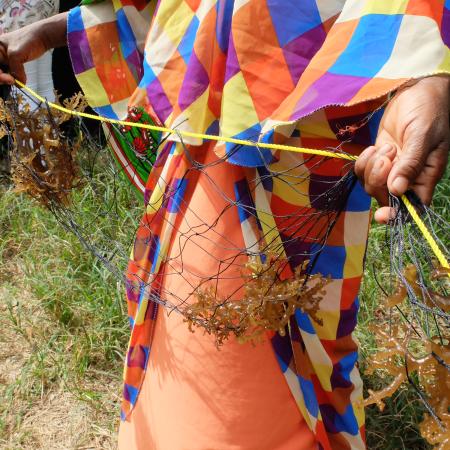
Lorsque la culture des algues a débuté à Zanzibar, il y a 30 ans, elle a été saluée comme une réussite, offrant aux femmes productrices une indépendance économique, une chance d'exercer une activité en dehors de leur domicile et un moyen de faire valoir leurs droits.
Mais ce n'est plus le cas aujourd'hui. Avec l'arrivée progressive du changement climatique, la hausse des températures de la mer et les variations de salinité ont considérablement réduit la quantité d'algues qui poussent le long des côtes de Zanzibar, et mettent en péril les moyens de subsistance des femmes productrices d'algues. Utilisant la technique traditionnelle de la corde à linge, les femmes travaillent dans des conditions épouvantables, mais leurs revenus sont maigres et loin d'être à la hauteur de leurs efforts : un kilo d'algues Cottonii séchées se vend à seulement 0,4 dollar US, et un kilo d'algues Spinosum séchées à seulement 0,2 dollar US.
Forts de ces considérations, le Dr Flower Msuya, moi-même et trois autres collègues de Zanzibar, de Tanzanie continentale et du Kenya, avons eu l'idée d'introduire une nouvelle technologie de culture des algues - les filets tubulaires en eau profonde - afin d'améliorer la productivité des algues et les moyens de subsistance et d'autonomisation des femmes. C'est ainsi que Sea PoWer a vu le jour.
Les filets tubulaires sont de longs tubes fabriqués à partir de filets de pêche, dans lesquels des bouquets d'algues sont placés à intervalles réguliers. Les filets contenant les algues sont ensuite transportés en mer sur un bateau et placés dans des eaux plus profondes (environ 5 à 10 m de profondeur) par un plongeur en apnée. Les filets sont maintenus en place par des cordes pesées par des sacs de sable au fond de la mer. Au moment de la récolte, les filets et leur contenu sont soulevés sur un bateau, ramenés à terre et ouverts pour en extraire les algues cultivées.
Cependant, l'utilisation de filets tubulaires présente un certain nombre de défis majeurs pour les femmes productrices. La culture et les traditions locales concernant les rôles assignés aux hommes et aux femmes dans la société empêchent les femmes d'effectuer certaines tâches telles que sortir en mer et s'engager dans des activités économiques sans demander la permission à leur mari. La prise en compte des facteurs culturels ainsi que des dynamiques de genre qui prévalent est donc essentielle pour l'introduction sensible de l'innovation dans les groupes de femmes cultivatrices d'algues et pour son adoption durable avant qu'elle ne soit étendue au reste de la région.
Sea PoWer a aidé les femmes productrices d'algues à se familiariser avec la technologie des filets tubulaires, à produire des algues de plus grande valeur, à acquérir des connaissances et des compétences dans la fabrication et l'utilisation des filets tubulaires, et à travailler en eaux profondes sans crainte.

